Functional Areas of Business: Description and Required Skills
VerifiedAdded on 2023/06/16
|11
|2262
|499
AI Summary
This report provides a detailed description of the various functional areas of business, including marketing, human resource management, customer service, finance, research and development, and sales. It also outlines the skills required by employees to work effectively in each of these areas. The report is relevant to students studying business management with foundation, specifically the course code BMP3004 - World of Work.
Contribute Materials
Your contribution can guide someone’s learning journey. Share your
documents today.
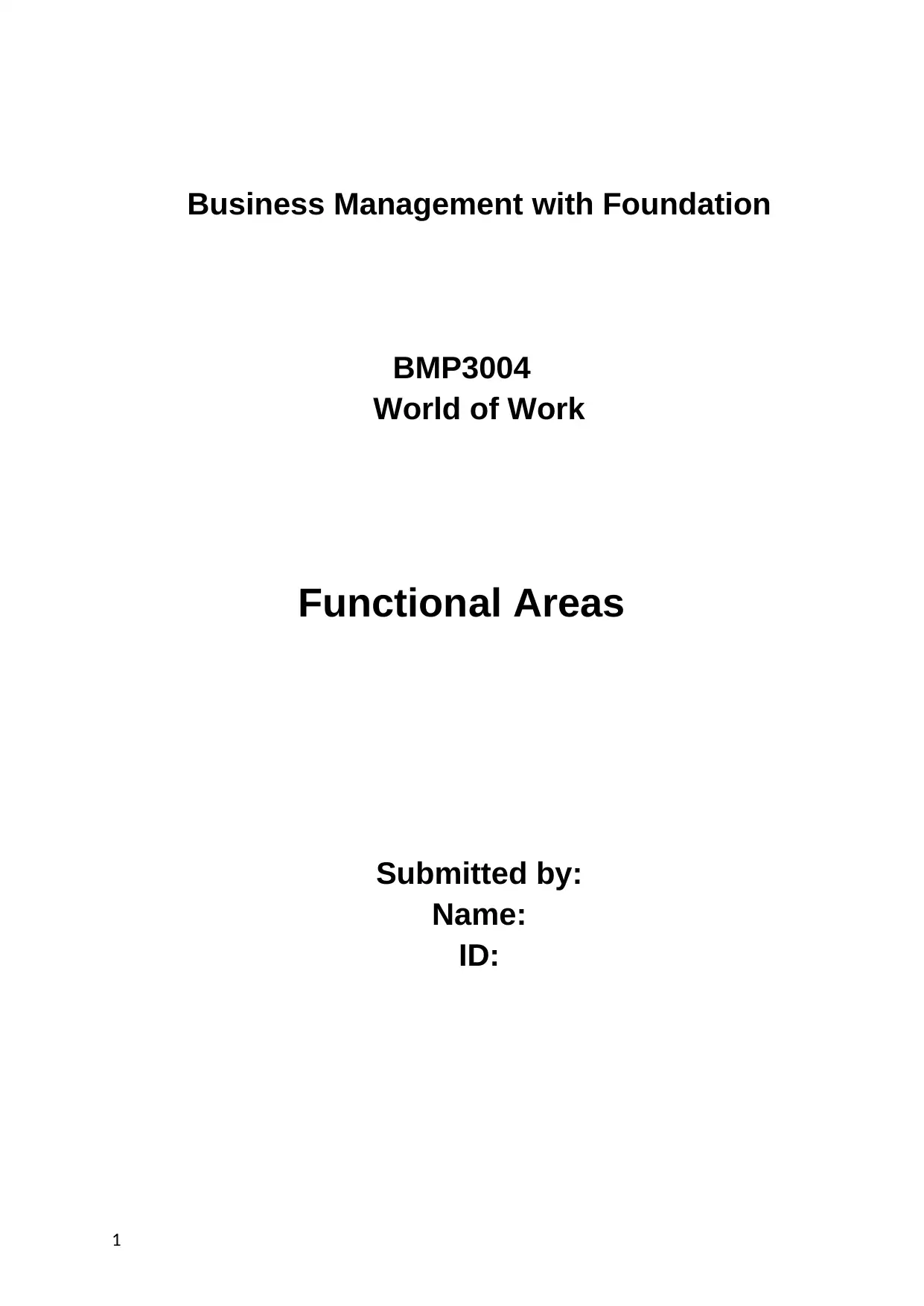
Business Management with Foundation
BMP3004
World of Work
Functional Areas
Submitted by:
Name:
ID:
1
BMP3004
World of Work
Functional Areas
Submitted by:
Name:
ID:
1
Secure Best Marks with AI Grader
Need help grading? Try our AI Grader for instant feedback on your assignments.
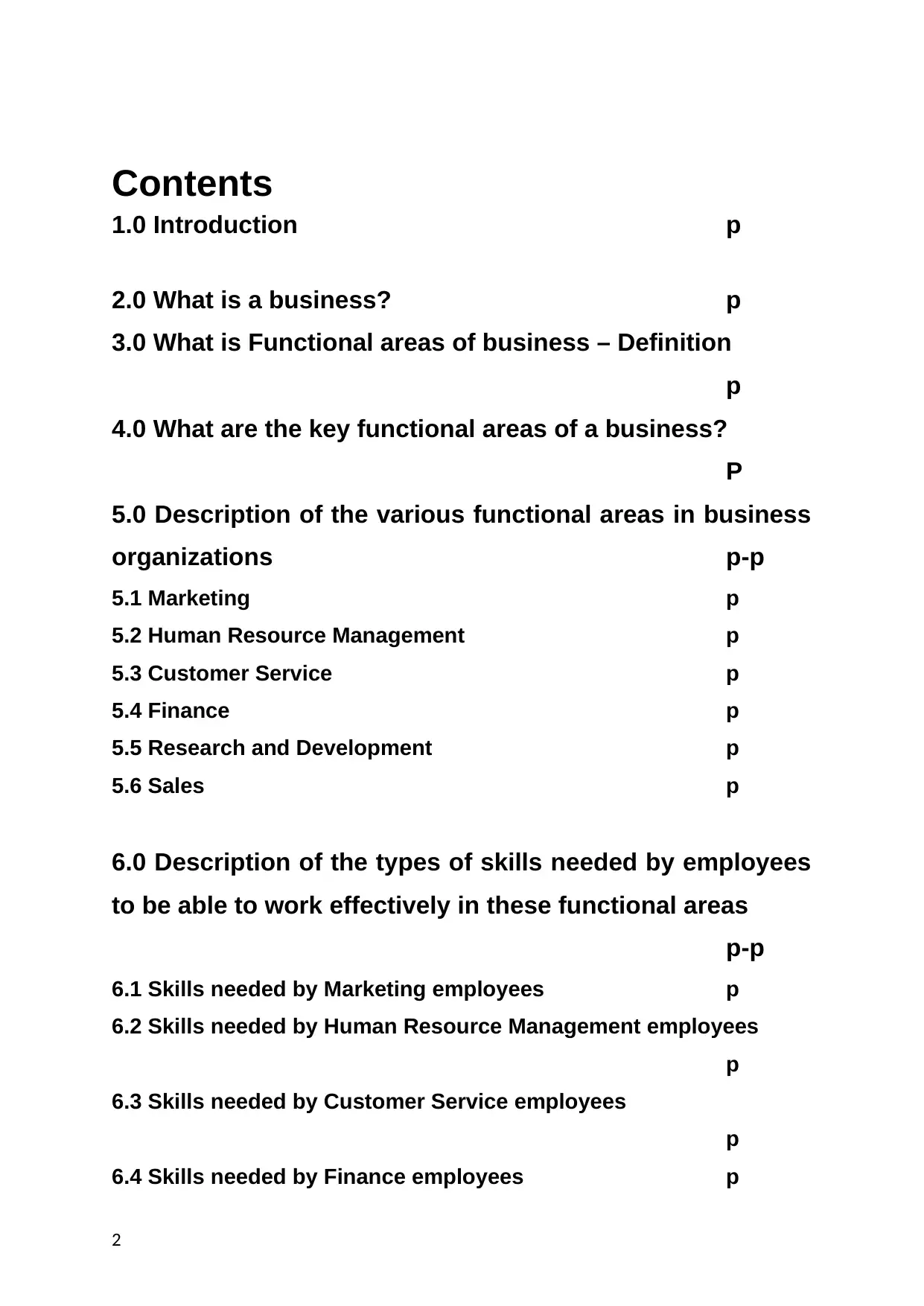
Contents
1.0 Introduction p
2.0 What is a business? p
3.0 What is Functional areas of business – Definition
p
4.0 What are the key functional areas of a business?
P
5.0 Description of the various functional areas in business
organizations p-p
5.1 Marketing p
5.2 Human Resource Management p
5.3 Customer Service p
5.4 Finance p
5.5 Research and Development p
5.6 Sales p
6.0 Description of the types of skills needed by employees
to be able to work effectively in these functional areas
p-p
6.1 Skills needed by Marketing employees p
6.2 Skills needed by Human Resource Management employees
p
6.3 Skills needed by Customer Service employees
p
6.4 Skills needed by Finance employees p
2
1.0 Introduction p
2.0 What is a business? p
3.0 What is Functional areas of business – Definition
p
4.0 What are the key functional areas of a business?
P
5.0 Description of the various functional areas in business
organizations p-p
5.1 Marketing p
5.2 Human Resource Management p
5.3 Customer Service p
5.4 Finance p
5.5 Research and Development p
5.6 Sales p
6.0 Description of the types of skills needed by employees
to be able to work effectively in these functional areas
p-p
6.1 Skills needed by Marketing employees p
6.2 Skills needed by Human Resource Management employees
p
6.3 Skills needed by Customer Service employees
p
6.4 Skills needed by Finance employees p
2
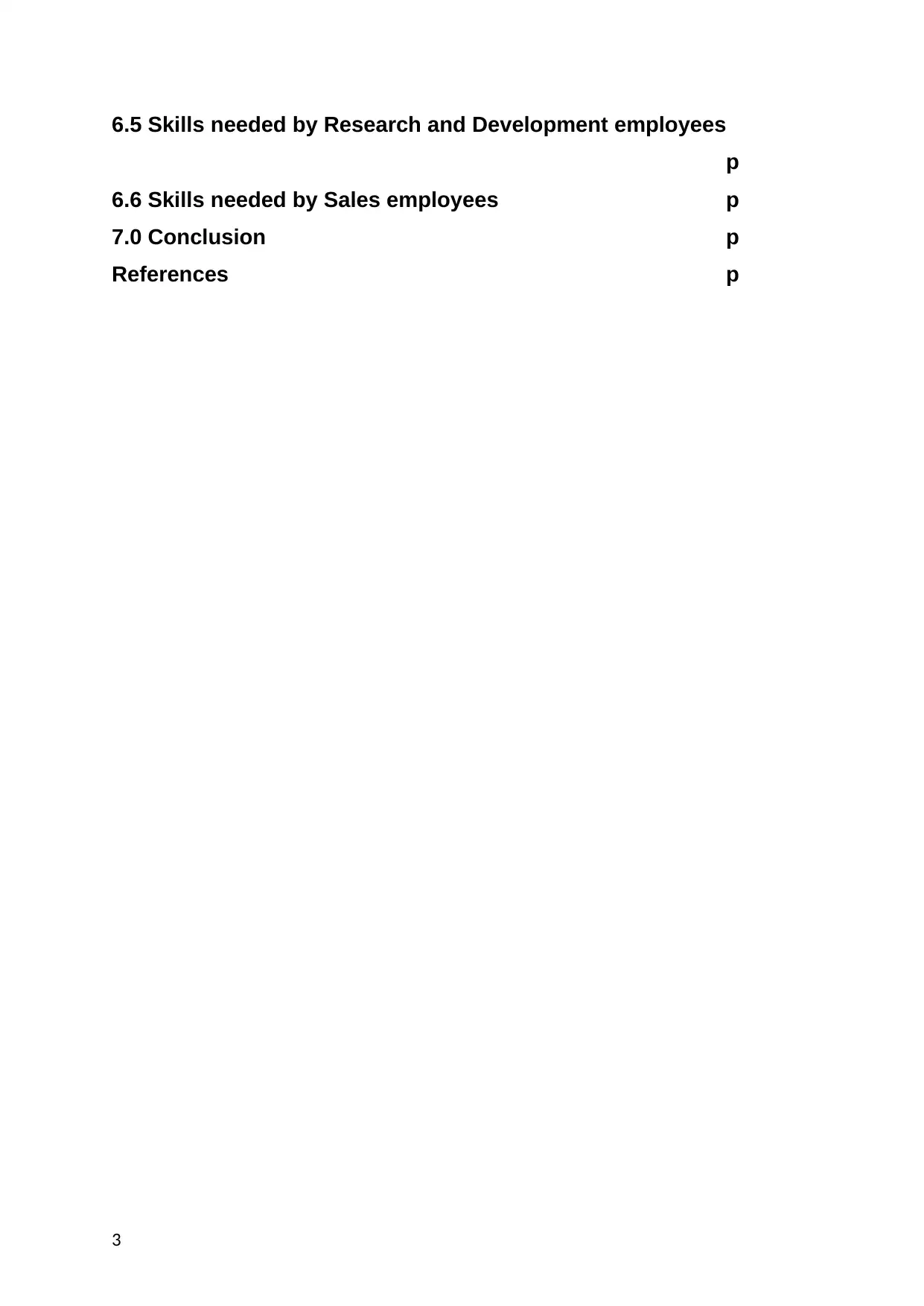
6.5 Skills needed by Research and Development employees
p
6.6 Skills needed by Sales employees p
7.0 Conclusion p
References p
3
p
6.6 Skills needed by Sales employees p
7.0 Conclusion p
References p
3

4
Secure Best Marks with AI Grader
Need help grading? Try our AI Grader for instant feedback on your assignments.
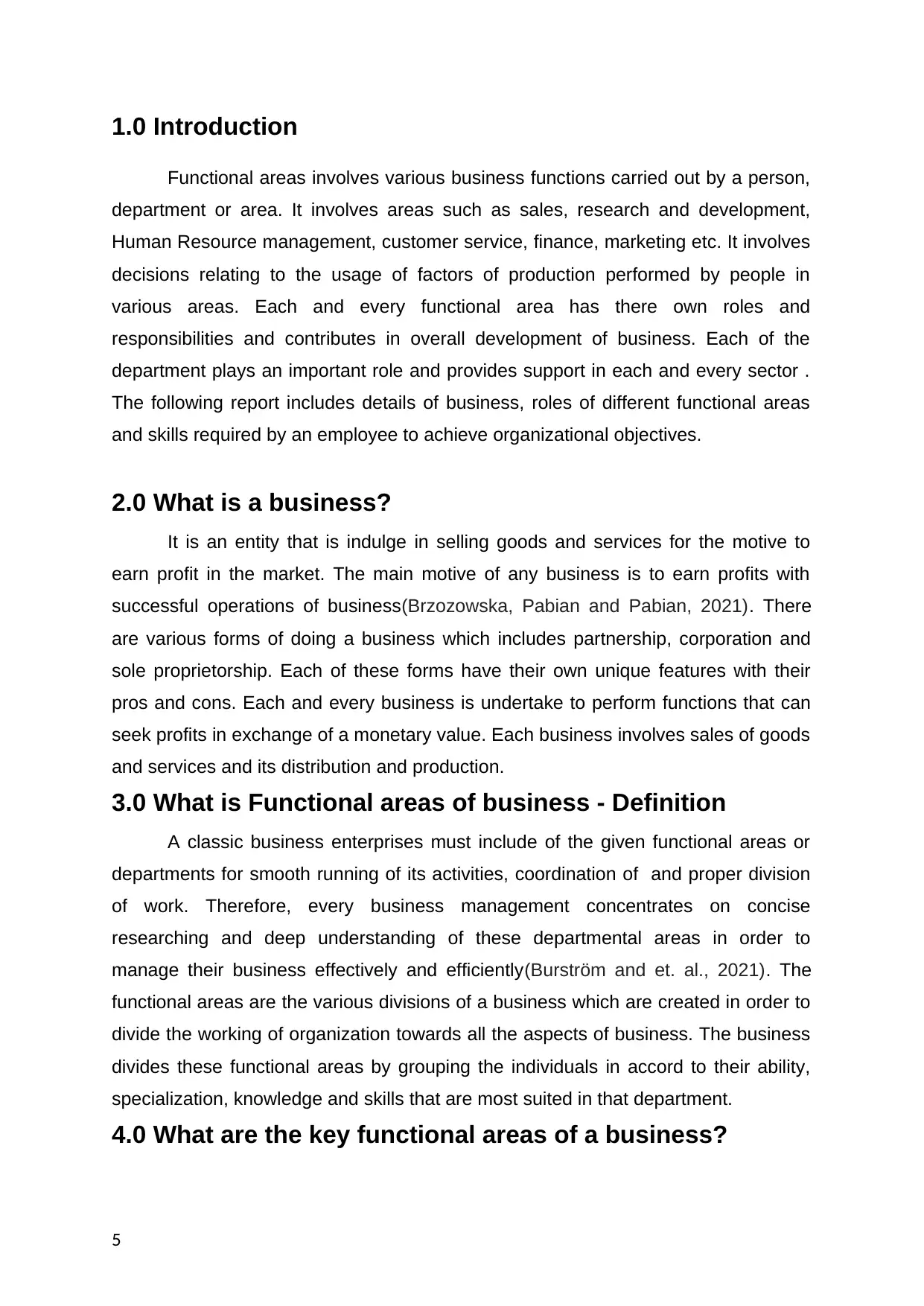
1.0 Introduction
Functional areas involves various business functions carried out by a person,
department or area. It involves areas such as sales, research and development,
Human Resource management, customer service, finance, marketing etc. It involves
decisions relating to the usage of factors of production performed by people in
various areas. Each and every functional area has there own roles and
responsibilities and contributes in overall development of business. Each of the
department plays an important role and provides support in each and every sector .
The following report includes details of business, roles of different functional areas
and skills required by an employee to achieve organizational objectives.
2.0 What is a business?
It is an entity that is indulge in selling goods and services for the motive to
earn profit in the market. The main motive of any business is to earn profits with
successful operations of business(Brzozowska, Pabian and Pabian, 2021). There
are various forms of doing a business which includes partnership, corporation and
sole proprietorship. Each of these forms have their own unique features with their
pros and cons. Each and every business is undertake to perform functions that can
seek profits in exchange of a monetary value. Each business involves sales of goods
and services and its distribution and production.
3.0 What is Functional areas of business - Definition
A classic business enterprises must include of the given functional areas or
departments for smooth running of its activities, coordination of and proper division
of work. Therefore, every business management concentrates on concise
researching and deep understanding of these departmental areas in order to
manage their business effectively and efficiently(Burström and et. al., 2021). The
functional areas are the various divisions of a business which are created in order to
divide the working of organization towards all the aspects of business. The business
divides these functional areas by grouping the individuals in accord to their ability,
specialization, knowledge and skills that are most suited in that department.
4.0 What are the key functional areas of a business?
5
Functional areas involves various business functions carried out by a person,
department or area. It involves areas such as sales, research and development,
Human Resource management, customer service, finance, marketing etc. It involves
decisions relating to the usage of factors of production performed by people in
various areas. Each and every functional area has there own roles and
responsibilities and contributes in overall development of business. Each of the
department plays an important role and provides support in each and every sector .
The following report includes details of business, roles of different functional areas
and skills required by an employee to achieve organizational objectives.
2.0 What is a business?
It is an entity that is indulge in selling goods and services for the motive to
earn profit in the market. The main motive of any business is to earn profits with
successful operations of business(Brzozowska, Pabian and Pabian, 2021). There
are various forms of doing a business which includes partnership, corporation and
sole proprietorship. Each of these forms have their own unique features with their
pros and cons. Each and every business is undertake to perform functions that can
seek profits in exchange of a monetary value. Each business involves sales of goods
and services and its distribution and production.
3.0 What is Functional areas of business - Definition
A classic business enterprises must include of the given functional areas or
departments for smooth running of its activities, coordination of and proper division
of work. Therefore, every business management concentrates on concise
researching and deep understanding of these departmental areas in order to
manage their business effectively and efficiently(Burström and et. al., 2021). The
functional areas are the various divisions of a business which are created in order to
divide the working of organization towards all the aspects of business. The business
divides these functional areas by grouping the individuals in accord to their ability,
specialization, knowledge and skills that are most suited in that department.
4.0 What are the key functional areas of a business?
5
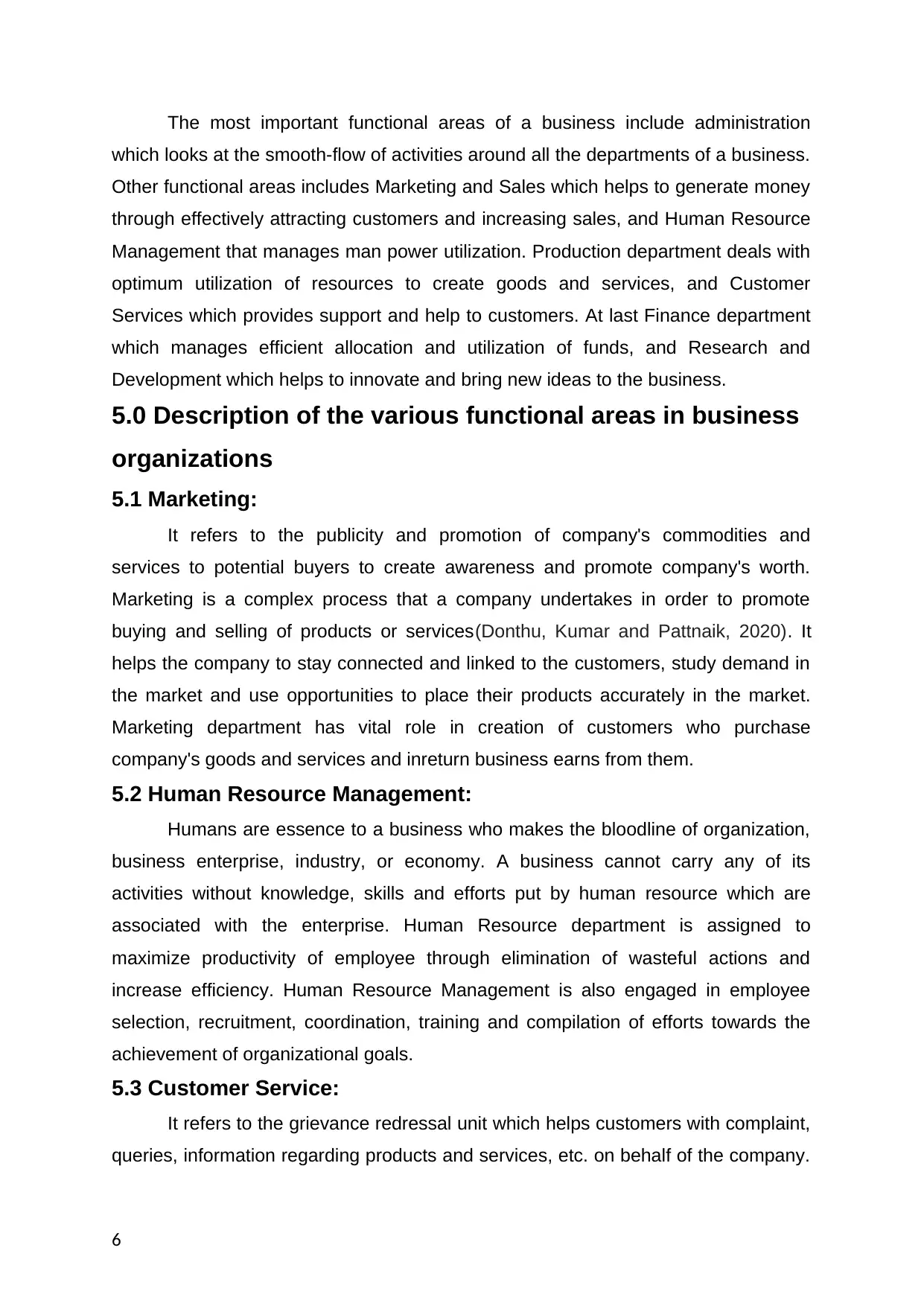
The most important functional areas of a business include administration
which looks at the smooth-flow of activities around all the departments of a business.
Other functional areas includes Marketing and Sales which helps to generate money
through effectively attracting customers and increasing sales, and Human Resource
Management that manages man power utilization. Production department deals with
optimum utilization of resources to create goods and services, and Customer
Services which provides support and help to customers. At last Finance department
which manages efficient allocation and utilization of funds, and Research and
Development which helps to innovate and bring new ideas to the business.
5.0 Description of the various functional areas in business
organizations
5.1 Marketing:
It refers to the publicity and promotion of company's commodities and
services to potential buyers to create awareness and promote company's worth.
Marketing is a complex process that a company undertakes in order to promote
buying and selling of products or services(Donthu, Kumar and Pattnaik, 2020). It
helps the company to stay connected and linked to the customers, study demand in
the market and use opportunities to place their products accurately in the market.
Marketing department has vital role in creation of customers who purchase
company's goods and services and inreturn business earns from them.
5.2 Human Resource Management:
Humans are essence to a business who makes the bloodline of organization,
business enterprise, industry, or economy. A business cannot carry any of its
activities without knowledge, skills and efforts put by human resource which are
associated with the enterprise. Human Resource department is assigned to
maximize productivity of employee through elimination of wasteful actions and
increase efficiency. Human Resource Management is also engaged in employee
selection, recruitment, coordination, training and compilation of efforts towards the
achievement of organizational goals.
5.3 Customer Service:
It refers to the grievance redressal unit which helps customers with complaint,
queries, information regarding products and services, etc. on behalf of the company.
6
which looks at the smooth-flow of activities around all the departments of a business.
Other functional areas includes Marketing and Sales which helps to generate money
through effectively attracting customers and increasing sales, and Human Resource
Management that manages man power utilization. Production department deals with
optimum utilization of resources to create goods and services, and Customer
Services which provides support and help to customers. At last Finance department
which manages efficient allocation and utilization of funds, and Research and
Development which helps to innovate and bring new ideas to the business.
5.0 Description of the various functional areas in business
organizations
5.1 Marketing:
It refers to the publicity and promotion of company's commodities and
services to potential buyers to create awareness and promote company's worth.
Marketing is a complex process that a company undertakes in order to promote
buying and selling of products or services(Donthu, Kumar and Pattnaik, 2020). It
helps the company to stay connected and linked to the customers, study demand in
the market and use opportunities to place their products accurately in the market.
Marketing department has vital role in creation of customers who purchase
company's goods and services and inreturn business earns from them.
5.2 Human Resource Management:
Humans are essence to a business who makes the bloodline of organization,
business enterprise, industry, or economy. A business cannot carry any of its
activities without knowledge, skills and efforts put by human resource which are
associated with the enterprise. Human Resource department is assigned to
maximize productivity of employee through elimination of wasteful actions and
increase efficiency. Human Resource Management is also engaged in employee
selection, recruitment, coordination, training and compilation of efforts towards the
achievement of organizational goals.
5.3 Customer Service:
It refers to the grievance redressal unit which helps customers with complaint,
queries, information regarding products and services, etc. on behalf of the company.
6
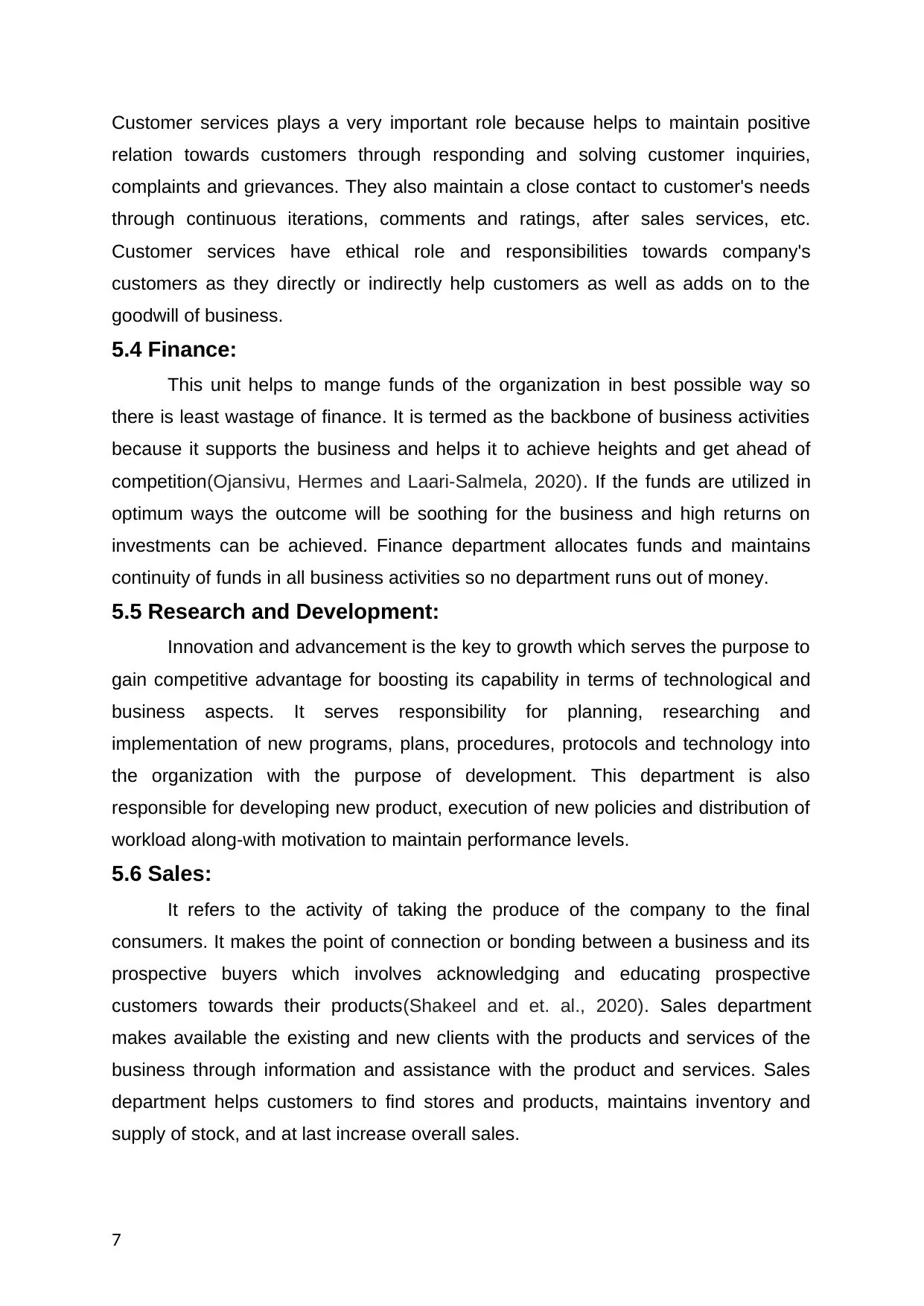
Customer services plays a very important role because helps to maintain positive
relation towards customers through responding and solving customer inquiries,
complaints and grievances. They also maintain a close contact to customer's needs
through continuous iterations, comments and ratings, after sales services, etc.
Customer services have ethical role and responsibilities towards company's
customers as they directly or indirectly help customers as well as adds on to the
goodwill of business.
5.4 Finance:
This unit helps to mange funds of the organization in best possible way so
there is least wastage of finance. It is termed as the backbone of business activities
because it supports the business and helps it to achieve heights and get ahead of
competition(Ojansivu, Hermes and Laari-Salmela, 2020). If the funds are utilized in
optimum ways the outcome will be soothing for the business and high returns on
investments can be achieved. Finance department allocates funds and maintains
continuity of funds in all business activities so no department runs out of money.
5.5 Research and Development:
Innovation and advancement is the key to growth which serves the purpose to
gain competitive advantage for boosting its capability in terms of technological and
business aspects. It serves responsibility for planning, researching and
implementation of new programs, plans, procedures, protocols and technology into
the organization with the purpose of development. This department is also
responsible for developing new product, execution of new policies and distribution of
workload along-with motivation to maintain performance levels.
5.6 Sales:
It refers to the activity of taking the produce of the company to the final
consumers. It makes the point of connection or bonding between a business and its
prospective buyers which involves acknowledging and educating prospective
customers towards their products(Shakeel and et. al., 2020). Sales department
makes available the existing and new clients with the products and services of the
business through information and assistance with the product and services. Sales
department helps customers to find stores and products, maintains inventory and
supply of stock, and at last increase overall sales.
7
relation towards customers through responding and solving customer inquiries,
complaints and grievances. They also maintain a close contact to customer's needs
through continuous iterations, comments and ratings, after sales services, etc.
Customer services have ethical role and responsibilities towards company's
customers as they directly or indirectly help customers as well as adds on to the
goodwill of business.
5.4 Finance:
This unit helps to mange funds of the organization in best possible way so
there is least wastage of finance. It is termed as the backbone of business activities
because it supports the business and helps it to achieve heights and get ahead of
competition(Ojansivu, Hermes and Laari-Salmela, 2020). If the funds are utilized in
optimum ways the outcome will be soothing for the business and high returns on
investments can be achieved. Finance department allocates funds and maintains
continuity of funds in all business activities so no department runs out of money.
5.5 Research and Development:
Innovation and advancement is the key to growth which serves the purpose to
gain competitive advantage for boosting its capability in terms of technological and
business aspects. It serves responsibility for planning, researching and
implementation of new programs, plans, procedures, protocols and technology into
the organization with the purpose of development. This department is also
responsible for developing new product, execution of new policies and distribution of
workload along-with motivation to maintain performance levels.
5.6 Sales:
It refers to the activity of taking the produce of the company to the final
consumers. It makes the point of connection or bonding between a business and its
prospective buyers which involves acknowledging and educating prospective
customers towards their products(Shakeel and et. al., 2020). Sales department
makes available the existing and new clients with the products and services of the
business through information and assistance with the product and services. Sales
department helps customers to find stores and products, maintains inventory and
supply of stock, and at last increase overall sales.
7
Paraphrase This Document
Need a fresh take? Get an instant paraphrase of this document with our AI Paraphraser
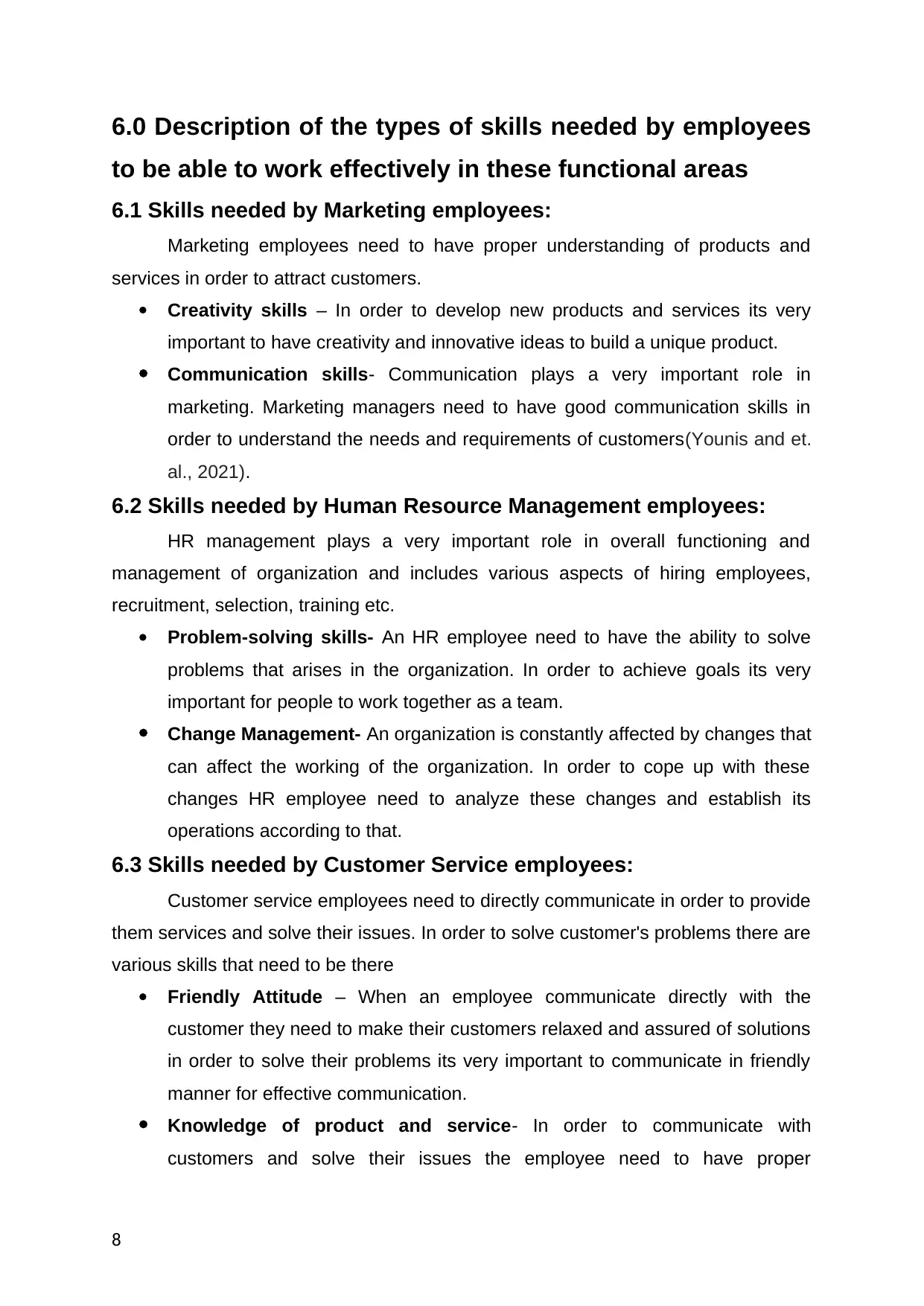
6.0 Description of the types of skills needed by employees
to be able to work effectively in these functional areas
6.1 Skills needed by Marketing employees:
Marketing employees need to have proper understanding of products and
services in order to attract customers.
Creativity skills – In order to develop new products and services its very
important to have creativity and innovative ideas to build a unique product.
Communication skills- Communication plays a very important role in
marketing. Marketing managers need to have good communication skills in
order to understand the needs and requirements of customers(Younis and et.
al., 2021).
6.2 Skills needed by Human Resource Management employees:
HR management plays a very important role in overall functioning and
management of organization and includes various aspects of hiring employees,
recruitment, selection, training etc.
Problem-solving skills- An HR employee need to have the ability to solve
problems that arises in the organization. In order to achieve goals its very
important for people to work together as a team.
Change Management- An organization is constantly affected by changes that
can affect the working of the organization. In order to cope up with these
changes HR employee need to analyze these changes and establish its
operations according to that.
6.3 Skills needed by Customer Service employees:
Customer service employees need to directly communicate in order to provide
them services and solve their issues. In order to solve customer's problems there are
various skills that need to be there
Friendly Attitude – When an employee communicate directly with the
customer they need to make their customers relaxed and assured of solutions
in order to solve their problems its very important to communicate in friendly
manner for effective communication.
Knowledge of product and service- In order to communicate with
customers and solve their issues the employee need to have proper
8
to be able to work effectively in these functional areas
6.1 Skills needed by Marketing employees:
Marketing employees need to have proper understanding of products and
services in order to attract customers.
Creativity skills – In order to develop new products and services its very
important to have creativity and innovative ideas to build a unique product.
Communication skills- Communication plays a very important role in
marketing. Marketing managers need to have good communication skills in
order to understand the needs and requirements of customers(Younis and et.
al., 2021).
6.2 Skills needed by Human Resource Management employees:
HR management plays a very important role in overall functioning and
management of organization and includes various aspects of hiring employees,
recruitment, selection, training etc.
Problem-solving skills- An HR employee need to have the ability to solve
problems that arises in the organization. In order to achieve goals its very
important for people to work together as a team.
Change Management- An organization is constantly affected by changes that
can affect the working of the organization. In order to cope up with these
changes HR employee need to analyze these changes and establish its
operations according to that.
6.3 Skills needed by Customer Service employees:
Customer service employees need to directly communicate in order to provide
them services and solve their issues. In order to solve customer's problems there are
various skills that need to be there
Friendly Attitude – When an employee communicate directly with the
customer they need to make their customers relaxed and assured of solutions
in order to solve their problems its very important to communicate in friendly
manner for effective communication.
Knowledge of product and service- In order to communicate with
customers and solve their issues the employee need to have proper
8
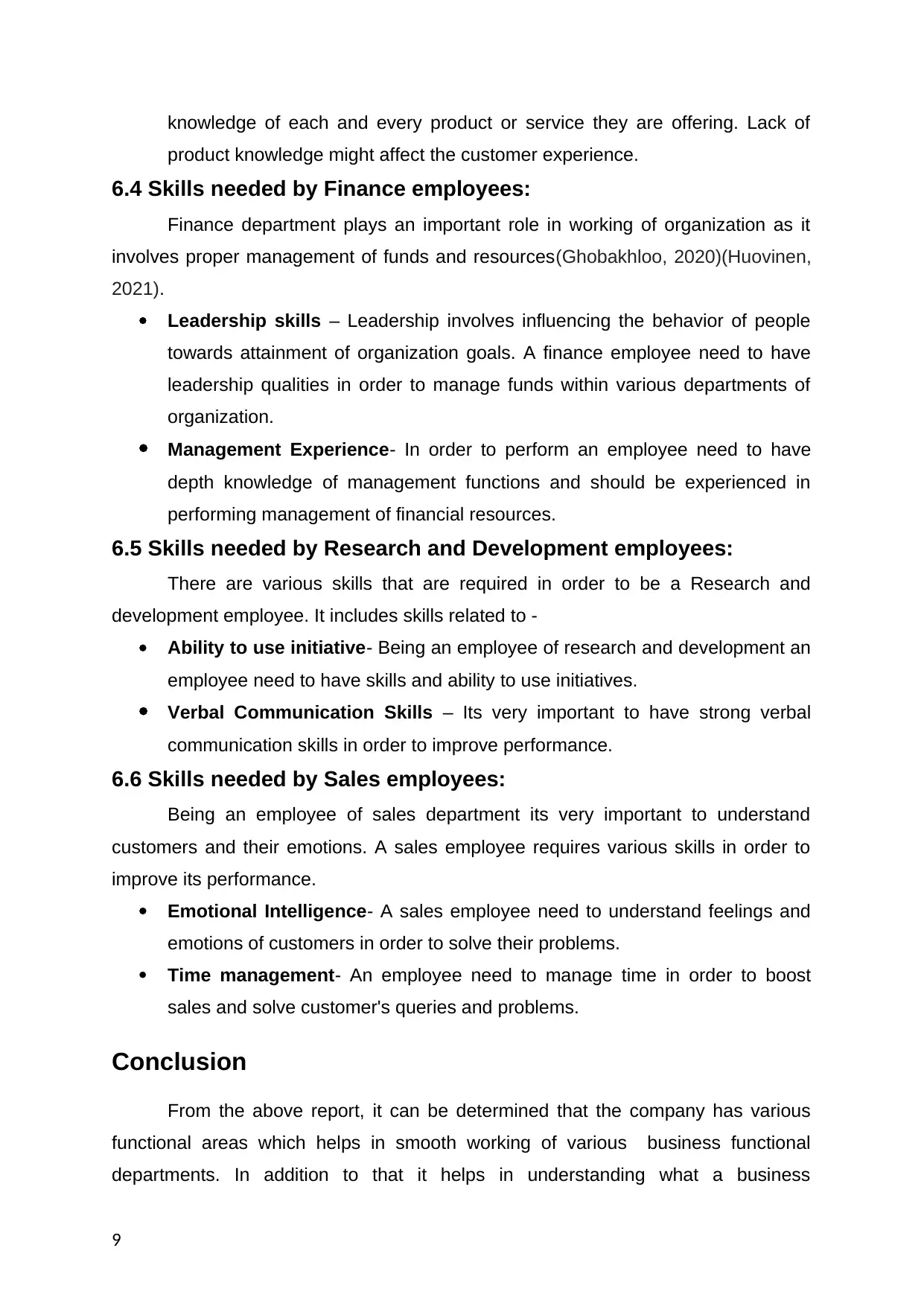
knowledge of each and every product or service they are offering. Lack of
product knowledge might affect the customer experience.
6.4 Skills needed by Finance employees:
Finance department plays an important role in working of organization as it
involves proper management of funds and resources(Ghobakhloo, 2020)(Huovinen,
2021).
Leadership skills – Leadership involves influencing the behavior of people
towards attainment of organization goals. A finance employee need to have
leadership qualities in order to manage funds within various departments of
organization.
Management Experience- In order to perform an employee need to have
depth knowledge of management functions and should be experienced in
performing management of financial resources.
6.5 Skills needed by Research and Development employees:
There are various skills that are required in order to be a Research and
development employee. It includes skills related to -
Ability to use initiative- Being an employee of research and development an
employee need to have skills and ability to use initiatives.
Verbal Communication Skills – Its very important to have strong verbal
communication skills in order to improve performance.
6.6 Skills needed by Sales employees:
Being an employee of sales department its very important to understand
customers and their emotions. A sales employee requires various skills in order to
improve its performance.
Emotional Intelligence- A sales employee need to understand feelings and
emotions of customers in order to solve their problems.
Time management- An employee need to manage time in order to boost
sales and solve customer's queries and problems.
Conclusion
From the above report, it can be determined that the company has various
functional areas which helps in smooth working of various business functional
departments. In addition to that it helps in understanding what a business
9
product knowledge might affect the customer experience.
6.4 Skills needed by Finance employees:
Finance department plays an important role in working of organization as it
involves proper management of funds and resources(Ghobakhloo, 2020)(Huovinen,
2021).
Leadership skills – Leadership involves influencing the behavior of people
towards attainment of organization goals. A finance employee need to have
leadership qualities in order to manage funds within various departments of
organization.
Management Experience- In order to perform an employee need to have
depth knowledge of management functions and should be experienced in
performing management of financial resources.
6.5 Skills needed by Research and Development employees:
There are various skills that are required in order to be a Research and
development employee. It includes skills related to -
Ability to use initiative- Being an employee of research and development an
employee need to have skills and ability to use initiatives.
Verbal Communication Skills – Its very important to have strong verbal
communication skills in order to improve performance.
6.6 Skills needed by Sales employees:
Being an employee of sales department its very important to understand
customers and their emotions. A sales employee requires various skills in order to
improve its performance.
Emotional Intelligence- A sales employee need to understand feelings and
emotions of customers in order to solve their problems.
Time management- An employee need to manage time in order to boost
sales and solve customer's queries and problems.
Conclusion
From the above report, it can be determined that the company has various
functional areas which helps in smooth working of various business functional
departments. In addition to that it helps in understanding what a business
9
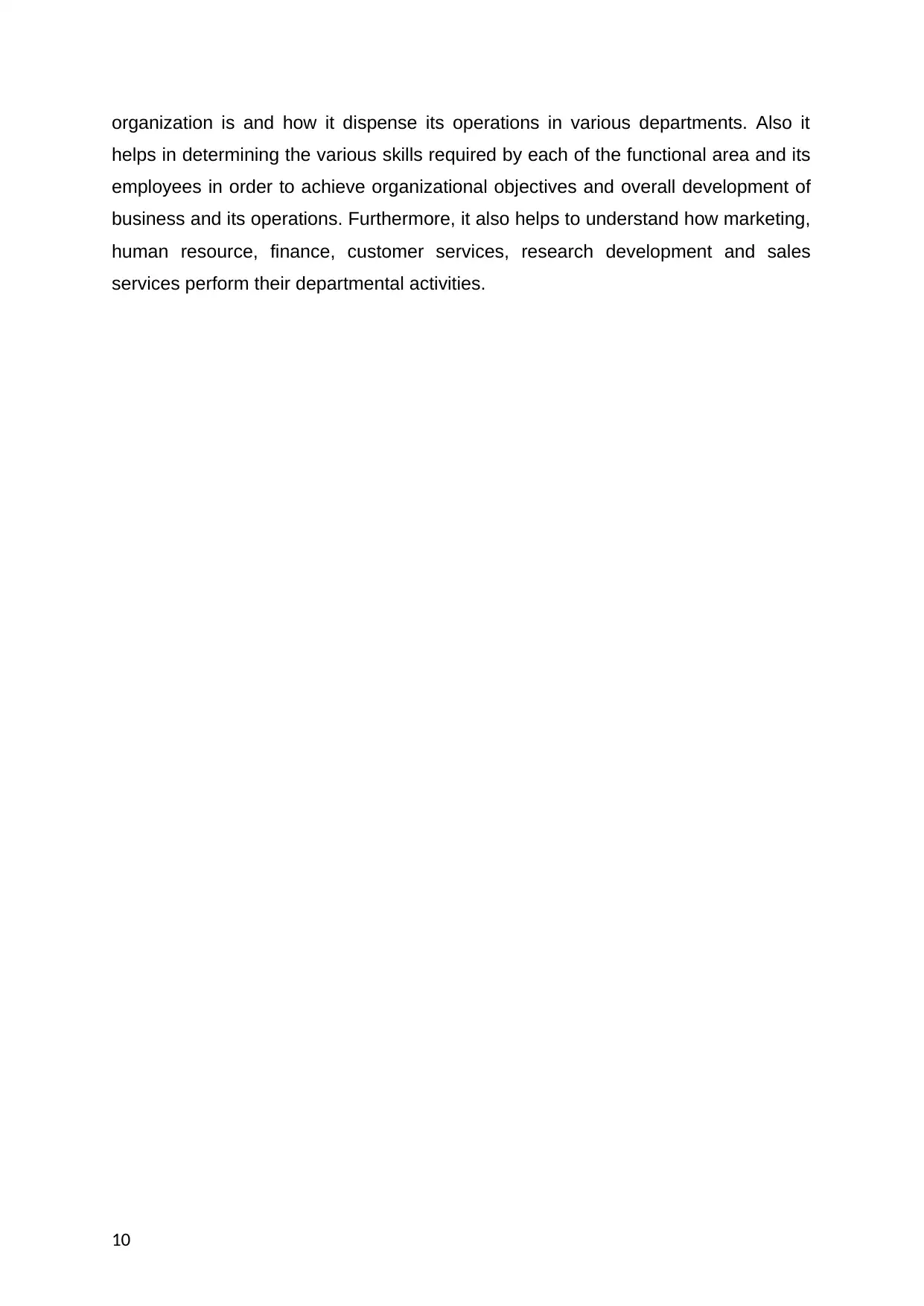
organization is and how it dispense its operations in various departments. Also it
helps in determining the various skills required by each of the functional area and its
employees in order to achieve organizational objectives and overall development of
business and its operations. Furthermore, it also helps to understand how marketing,
human resource, finance, customer services, research development and sales
services perform their departmental activities.
10
helps in determining the various skills required by each of the functional area and its
employees in order to achieve organizational objectives and overall development of
business and its operations. Furthermore, it also helps to understand how marketing,
human resource, finance, customer services, research development and sales
services perform their departmental activities.
10
Secure Best Marks with AI Grader
Need help grading? Try our AI Grader for instant feedback on your assignments.
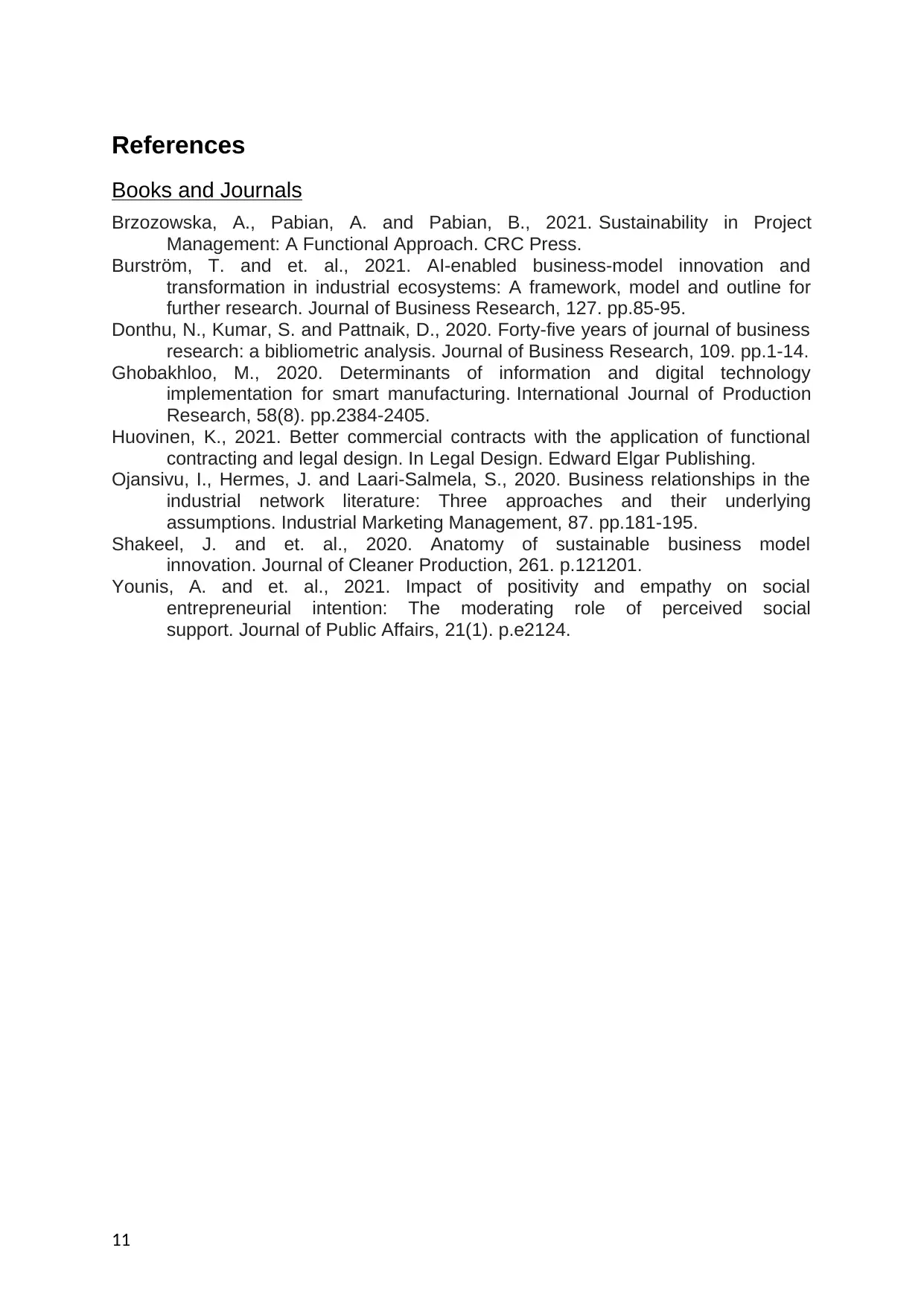
References
Books and Journals
Brzozowska, A., Pabian, A. and Pabian, B., 2021. Sustainability in Project
Management: A Functional Approach. CRC Press.
Burström, T. and et. al., 2021. AI-enabled business-model innovation and
transformation in industrial ecosystems: A framework, model and outline for
further research. Journal of Business Research, 127. pp.85-95.
Donthu, N., Kumar, S. and Pattnaik, D., 2020. Forty-five years of journal of business
research: a bibliometric analysis. Journal of Business Research, 109. pp.1-14.
Ghobakhloo, M., 2020. Determinants of information and digital technology
implementation for smart manufacturing. International Journal of Production
Research, 58(8). pp.2384-2405.
Huovinen, K., 2021. Better commercial contracts with the application of functional
contracting and legal design. In Legal Design. Edward Elgar Publishing.
Ojansivu, I., Hermes, J. and Laari-Salmela, S., 2020. Business relationships in the
industrial network literature: Three approaches and their underlying
assumptions. Industrial Marketing Management, 87. pp.181-195.
Shakeel, J. and et. al., 2020. Anatomy of sustainable business model
innovation. Journal of Cleaner Production, 261. p.121201.
Younis, A. and et. al., 2021. Impact of positivity and empathy on social
entrepreneurial intention: The moderating role of perceived social
support. Journal of Public Affairs, 21(1). p.e2124.
11
Books and Journals
Brzozowska, A., Pabian, A. and Pabian, B., 2021. Sustainability in Project
Management: A Functional Approach. CRC Press.
Burström, T. and et. al., 2021. AI-enabled business-model innovation and
transformation in industrial ecosystems: A framework, model and outline for
further research. Journal of Business Research, 127. pp.85-95.
Donthu, N., Kumar, S. and Pattnaik, D., 2020. Forty-five years of journal of business
research: a bibliometric analysis. Journal of Business Research, 109. pp.1-14.
Ghobakhloo, M., 2020. Determinants of information and digital technology
implementation for smart manufacturing. International Journal of Production
Research, 58(8). pp.2384-2405.
Huovinen, K., 2021. Better commercial contracts with the application of functional
contracting and legal design. In Legal Design. Edward Elgar Publishing.
Ojansivu, I., Hermes, J. and Laari-Salmela, S., 2020. Business relationships in the
industrial network literature: Three approaches and their underlying
assumptions. Industrial Marketing Management, 87. pp.181-195.
Shakeel, J. and et. al., 2020. Anatomy of sustainable business model
innovation. Journal of Cleaner Production, 261. p.121201.
Younis, A. and et. al., 2021. Impact of positivity and empathy on social
entrepreneurial intention: The moderating role of perceived social
support. Journal of Public Affairs, 21(1). p.e2124.
11
1 out of 11
Related Documents
Your All-in-One AI-Powered Toolkit for Academic Success.
+13062052269
info@desklib.com
Available 24*7 on WhatsApp / Email
![[object Object]](/_next/static/media/star-bottom.7253800d.svg)
Unlock your academic potential
© 2024 | Zucol Services PVT LTD | All rights reserved.
